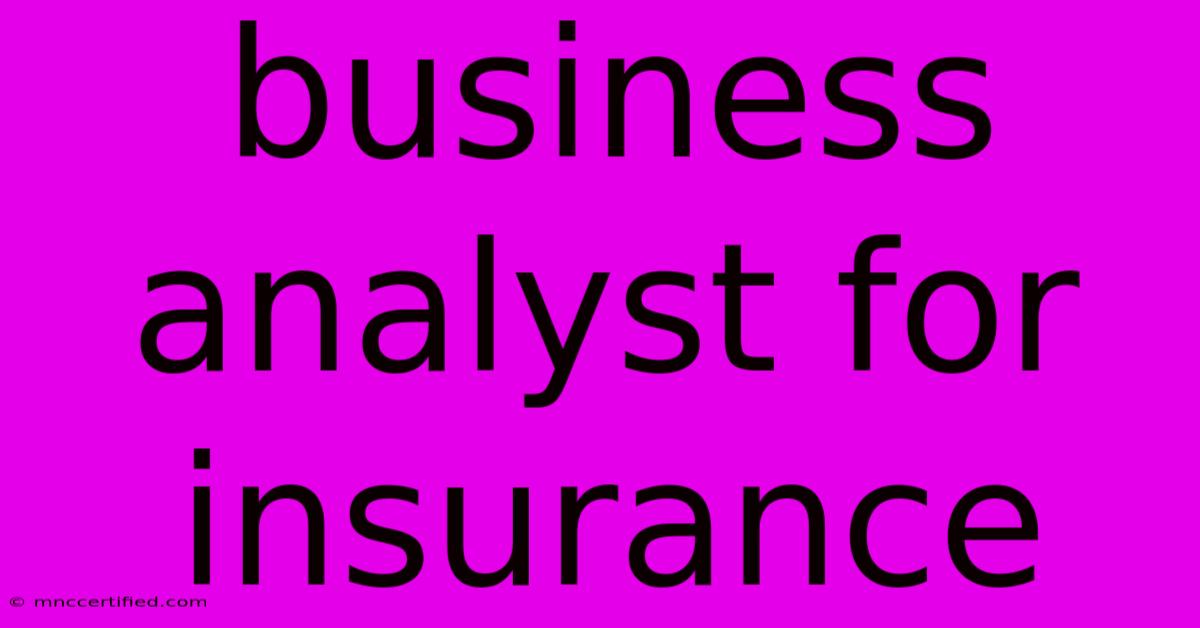Business Analyst For Insurance

Table of Contents
Business Analyst for Insurance: A Comprehensive Guide
The insurance industry is undergoing a massive transformation, driven by technological advancements, evolving customer expectations, and increasing regulatory pressures. This creates a high demand for skilled business analysts in insurance. But what exactly does this role entail, and what skills are needed to excel? This comprehensive guide will explore the world of the insurance business analyst, covering everything from responsibilities to career prospects.
What Does a Business Analyst in Insurance Do?
A business analyst for insurance acts as a bridge between business needs and technical solutions. They analyze complex business problems, identify opportunities for improvement, and translate those insights into actionable strategies. Their work is crucial for streamlining operations, improving customer experiences, and driving profitability within the insurance sector. Specific tasks often include:
- Requirements Elicitation and Documentation: Gathering and documenting requirements from various stakeholders, including underwriters, claims adjusters, and IT teams. This often involves conducting interviews, workshops, and surveys.
- Process Modeling and Improvement: Analyzing existing business processes to identify inefficiencies and bottlenecks. They then design and implement improved processes using methodologies like Lean and Six Sigma.
- Data Analysis: Analyzing large datasets to identify trends, patterns, and insights that can inform business decisions. Proficiency in SQL and data visualization tools is highly valuable.
- System Implementation and Testing: Working closely with IT teams to ensure that new systems meet business requirements and are implemented successfully. This includes participating in testing and user acceptance testing (UAT).
- Project Management Support: Supporting project managers by providing insights into business requirements and risks. Understanding Agile methodologies is beneficial.
- Regulatory Compliance: Ensuring that systems and processes comply with relevant insurance regulations and industry best practices.
Key Skills for Success
To thrive as an insurance business analyst, you need a blend of hard and soft skills. Here are some crucial competencies:
- Analytical Skills: The ability to analyze complex data, identify patterns, and draw meaningful conclusions.
- Problem-Solving Skills: The capacity to identify and solve problems creatively and efficiently.
- Communication Skills: Excellent written and verbal communication skills to effectively interact with stakeholders at all levels.
- Technical Skills: Proficiency in SQL, data visualization tools (e.g., Tableau, Power BI), and potentially programming languages like Python or R.
- Business Acumen: A solid understanding of insurance principles, products, and processes.
- Domain Knowledge: Familiarity with specific insurance domains (e.g., life insurance, property and casualty insurance) is a significant advantage.
- Project Management Skills: Understanding of project management methodologies (e.g., Agile, Waterfall).
Career Path and Salary Expectations
The career path for a business analyst in the insurance industry offers excellent opportunities for growth and advancement. With experience, you can progress to senior analyst roles, management positions, or even specialize in a particular area like claims processing or underwriting.
Salary expectations vary based on experience, location, and employer. However, entry-level insurance business analyst salaries are generally competitive, and experienced professionals can command significantly higher salaries. Researching salary data specific to your location and experience level is recommended using sites like Glassdoor or Salary.com.
How to Become a Business Analyst in Insurance
While a specific degree isn't always mandatory, a bachelor's degree in a relevant field like business administration, finance, or computer science is often preferred. Furthermore, certifications like the Certified Business Analysis Professional (CBAP) can enhance your credentials and demonstrate your commitment to the profession. Gaining experience through internships or entry-level roles can also significantly boost your career prospects. Networking within the insurance industry is crucial for finding opportunities and building connections.
The Future of Business Analysts in Insurance
The insurance industry is undergoing rapid digital transformation, creating an even greater demand for skilled business analysts. The adoption of technologies like AI, machine learning, and blockchain will require professionals capable of bridging the gap between business needs and technological advancements. This means opportunities for business analysts in insurance are not only plentiful but also evolving, requiring continuous learning and adaptation to new technologies and methodologies.
By mastering the skills and knowledge outlined in this guide, aspiring business analysts can position themselves for success in this dynamic and rewarding field. The insurance industry offers a unique blend of analytical challenges and real-world impact, making it an exciting and fulfilling career path.

Thank you for visiting our website wich cover about Business Analyst For Insurance. We hope the information provided has been useful to you. Feel free to contact us if you have any questions or need further assistance. See you next time and dont miss to bookmark.
Featured Posts
-
St Johns Insurance Company Inc
Nov 27, 2024
-
Manchester City Vs Feyenoord Ucl Live
Nov 27, 2024
-
Elephant Insurance Data Breach
Nov 27, 2024
-
Bh Liability Renters Insurance
Nov 27, 2024
-
Siberian Permafrost Yields Ancient Cub
Nov 27, 2024